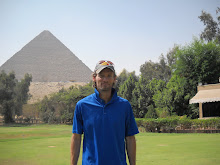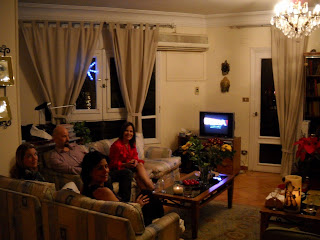.jpg)
Wednesday, November 25, 2009
Lola and Linda's birthday, Thanksgiving meal no. 1
.jpg)
Saturday, November 21, 2009
Friday in Maadi
.jpg)
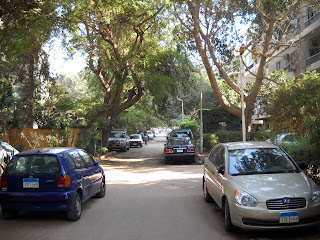.jpg)
.jpg)
.jpg)
.jpg)
.jpg)
.jpg)
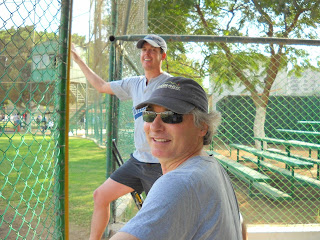.jpg)
.jpg)
.jpg)
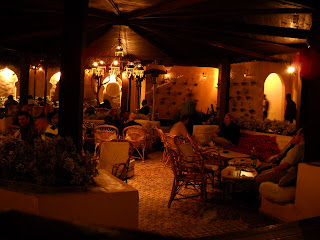.jpg)
.jpg)
.jpg)
Tuesday, November 17, 2009
Egypt vs. Algeria Part 1
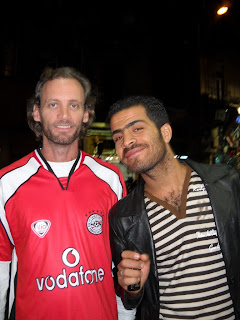.jpg) Boy--my hair is getting long!
Boy--my hair is getting long!.jpg)
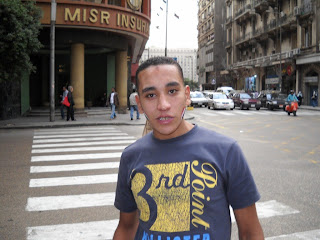.jpg)
.jpg) How they keep some of those running I have no idea. They mostly seem 30 years old and held together with bailing wire and chewing gum, but they find a way to keep them working. There are newer cabs around, but you haven't lived until you've been in a rickety, shaky old black and white cab in Cairo and smelled that lovely exhaust.
How they keep some of those running I have no idea. They mostly seem 30 years old and held together with bailing wire and chewing gum, but they find a way to keep them working. There are newer cabs around, but you haven't lived until you've been in a rickety, shaky old black and white cab in Cairo and smelled that lovely exhaust..jpg) Below is the Semiramis Hotel, which is my favorite place to go to the bathroom downtown. Public toilets are difficult to find in Cairo, but as a Westerner you can stroll into any 5 star hotel just like you own the place.
Below is the Semiramis Hotel, which is my favorite place to go to the bathroom downtown. Public toilets are difficult to find in Cairo, but as a Westerner you can stroll into any 5 star hotel just like you own the place..jpg)
.jpg)
Tuesday, November 3, 2009
Living in Egypt...
Moving to Egypt involves struggling with a lot of new things: The Arabic language, social customs, food, water, traffic, etc. Yet all of those things are quite manageable after you have been here for even just a short time. The largest struggle for me, however, has been my sense of social justice. Before I left Florida, I got a physical from a doctor in Pt St Lucie. Upon hearing that I was moving to Egypt, he told me, “You have more money in your pocket than most Egyptians make in a year.” I didn’t really believe him, but it is absolutely true.
The per capita income in Egypt is $2,000 per year. That means that on average a person in Egypt earns $2,000 per year. But the vast majority of the wealth is concentrated among a very small slice of the population, so most people make far less than that. I’ve tried to find statistics on median income, but I have not found any for Egypt (in the US the median household income is about $50,000 per year). But from asking around and through some hearsay from people connected to government circles, I think a rough (and probably generous) estimate for median income in Cairo is about 1,000 Egyptian pounds per month. At the current exchange rate of 5.6 Egyptian pounds per dollar that amounts to less than $200 per month. Now, things are certainly a lot cheaper here, but it still is difficult to live on $200 per month. And I think that is sort of middle class Egyptians, the people in the villages they have far less than that.
Food and fuel are heavily subsidized here. So most of the population can afford to eat the basic staples (rice, pasta, corn, beans) but little else. But the biggest sign of poverty is in basic services like health care. Things we take for granted, like basic dental care, vaccines, emergency rooms, etc. are not available to the vast majority of Egyptians.
This has become obvious to me because I feel enormously wealthy living here. I never felt that way in the States. I felt better off than most, but not part of the patrician class, shall we say. But here, there is no doubt that I am way, way, way ahead of virtually all of the locals. And it is entirely due to the fortunate accident that my birth occurred in the United States.
I am even more keenly aware than ever that I absolutely won life’s lottery at birth. If you are reading this, you did too! If you had been born to a poor Egyptian family, it doesn’t matter how smart you are or how hard you work, you will never have the choices and opportunities that are available to me just by virtue of having been born in the West. The whole situation is weighing on my sense of social justice, and I often ponder how to respond. You can’t change the world, or really even make that much of a difference, but I wonder just what is the decent thing to do in light of the disparity in resources that I have compared to almost everyone else I live with? It is something I’m going to sit with for some time, but I do hope to find a way to feel like the incredible good fortune I have wasn’t wasted.
I have a friend who pointed out to me that (a) saying “ooh those poor little Egyptians, they cannot live like us Westerners” is really an arrogant and unproductive attitude, and (b) it isn’t necessarily given that I’m happier or even that my life is better just because I am wealthier and (c) the real difference is in the choices and opportunities that I have available to me that simply are not available to the vast majority of Egyptians, and that is the important difference to work on. Food for thought.
Other random observations about living in Egypt:
(1) I drink a lot of water over here, I guess because of the desert climate. And in the US, I would only drink water that was ice cold. Now, room temperature is just fine. That goes for beer too, surprisingly. And I have learned to live without air conditioning. The general temperature indoors is just higher here, and you get used to it. And I like feeling like I’m helping the ecology of the planet. But if you come to visit, I’ll turn it on for you!
(2) I eat a lot less meat. Mostly pasta, rice, corn, beans (the stuff in fuul and kosharey), and of course cheese pizza. I need to add some fruits (I do buy OJ from time to time).
(3) I am learning Arabic, albeit at a snail’s pace. Recently I was coming back from a café, hailed a taxi, and the driver was unfamiliar with both my neighborhood and the English language. But I was able to tell him “no problem" (mufeesh muskella), and I know how to say left, right, straight and stop here in Arabic. So I made it fine. If you think about it, you really only need about 20 words or so to get by in a taxi. So I’m a graduate of taxi-cab Arabic, now I need to learn some of the harder stuff. I have a tutor coming twice a week (provided by the University, which is a nice perk), but boy, it is a difficult language. The alphabet is completely alien, and a lot of the sounds are also. She will ask me to repeat something, so I will, and she will say no, it isn’t said like A, but like B. And I tell her that A & B sound exactly the same to me! It is frustrating, but I’m going to keep trying a little at a time and over a year or two I guess I’ll make pretty good progress. On the other hand, when you live in a western dominated neighborhood like Maadi, teach at the American University, and all your friends are from the West, it is easy to go along without learning much of the language. And there are enough people around who speak at least a little English (because we have all the money) that I can always get by. So I continually fight that and try to get out and at least hear Arabic spoken. I am pleased that at least I have started to understand a little of the conversations around me. Not that I can follow the whole thing, but I can get a few phrases here and there.
Here is Sesame Street in Arabic, singing the ABCs for the Arabic alphabet. My tutor recommended this one to me:
(4) It seems like everyone I meet here has traveled the world. I meet twenty something’s who have been to India, Bangladesh, South America and Europe before settling in Egypt. Boy, I am behind the curve!
(5) I miss the boys. If you guys are reading this, I really, really miss you and I wish you were here.
Other than #5, however, this is a wonderful experience, and has changed me for the better. But I do look forward to spending January in the good ole USA. Starbucks coffee, vanilla soy milk, Kellogg’s Raisin Bran, college football on TV. And seeing family and friends. See you then!
PS: I think I will have a ticket to the Egypt vs. Algiers soccer match on November 14. I know, doesn’t sound like much to you guys, but it will determine whether Egypt qualifies for the World Cup or not. So think of it like an NFC championship game, or game 7 of the NLCS. If I go, I’ll take my camera, and that might be my next blog. En shallah!
Dinner at Sequoia

.jpg)
.jpg)
.jpg)
.jpg)
.jpg)
.jpg)

.jpg)
.jpg)


